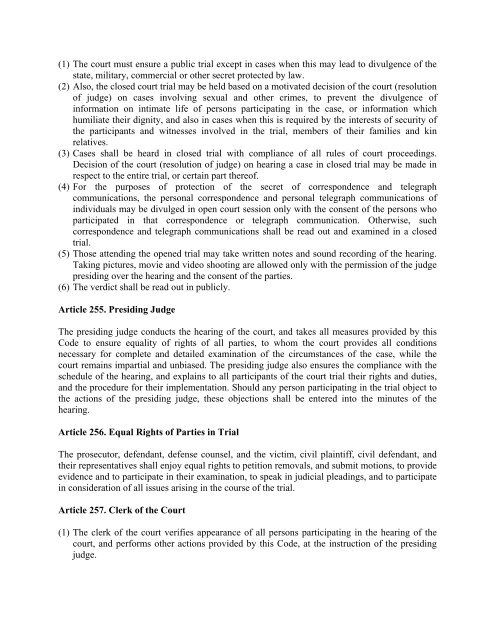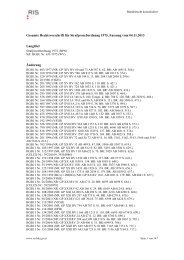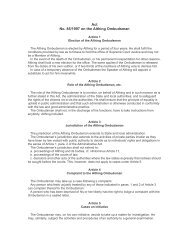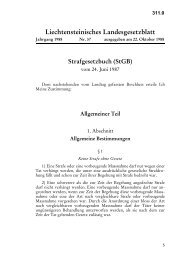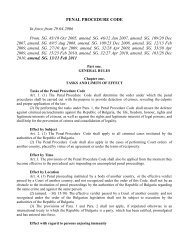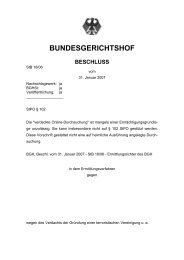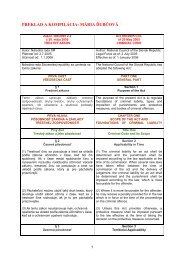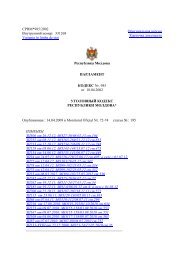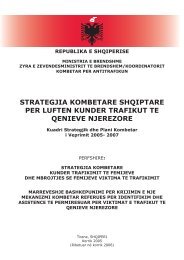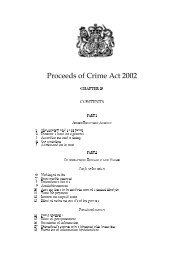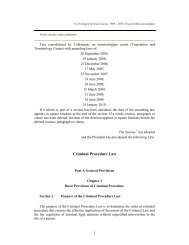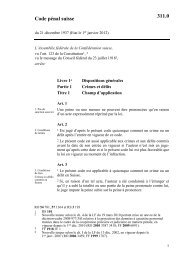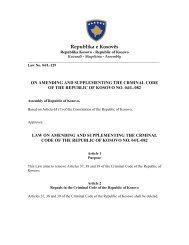Criminal Procedure Code of the Kyrgyz Republic - Legislationline
Criminal Procedure Code of the Kyrgyz Republic - Legislationline
Criminal Procedure Code of the Kyrgyz Republic - Legislationline
Create successful ePaper yourself
Turn your PDF publications into a flip-book with our unique Google optimized e-Paper software.
(1) The court must ensure a public trial except in cases when this may lead to divulgence <strong>of</strong> <strong>the</strong><br />
state, military, commercial or o<strong>the</strong>r secret protected by law.<br />
(2) Also, <strong>the</strong> closed court trial may be held based on a motivated decision <strong>of</strong> <strong>the</strong> court (resolution<br />
<strong>of</strong> judge) on cases involving sexual and o<strong>the</strong>r crimes, to prevent <strong>the</strong> divulgence <strong>of</strong><br />
information on intimate life <strong>of</strong> persons participating in <strong>the</strong> case, or information which<br />
humiliate <strong>the</strong>ir dignity, and also in cases when this is required by <strong>the</strong> interests <strong>of</strong> security <strong>of</strong><br />
<strong>the</strong> participants and witnesses involved in <strong>the</strong> trial, members <strong>of</strong> <strong>the</strong>ir families and kin<br />
relatives.<br />
(3) Cases shall be heard in closed trial with compliance <strong>of</strong> all rules <strong>of</strong> court proceedings.<br />
Decision <strong>of</strong> <strong>the</strong> court (resolution <strong>of</strong> judge) on hearing a case in closed trial may be made in<br />
respect to <strong>the</strong> entire trial, or certain part <strong>the</strong>re<strong>of</strong>.<br />
(4) For <strong>the</strong> purposes <strong>of</strong> protection <strong>of</strong> <strong>the</strong> secret <strong>of</strong> correspondence and telegraph<br />
communications, <strong>the</strong> personal correspondence and personal telegraph communications <strong>of</strong><br />
individuals may be divulged in open court session only with <strong>the</strong> consent <strong>of</strong> <strong>the</strong> persons who<br />
participated in that correspondence or telegraph communication. O<strong>the</strong>rwise, such<br />
correspondence and telegraph communications shall be read out and examined in a closed<br />
trial.<br />
(5) Those attending <strong>the</strong> opened trial may take written notes and sound recording <strong>of</strong> <strong>the</strong> hearing.<br />
Taking pictures, movie and video shooting are allowed only with <strong>the</strong> permission <strong>of</strong> <strong>the</strong> judge<br />
presiding over <strong>the</strong> hearing and <strong>the</strong> consent <strong>of</strong> <strong>the</strong> parties.<br />
(6) The verdict shall be read out in publicly.<br />
Article 255. Presiding Judge<br />
The presiding judge conducts <strong>the</strong> hearing <strong>of</strong> <strong>the</strong> court, and takes all measures provided by this<br />
<strong>Code</strong> to ensure equality <strong>of</strong> rights <strong>of</strong> all parties, to whom <strong>the</strong> court provides all conditions<br />
necessary for complete and detailed examination <strong>of</strong> <strong>the</strong> circumstances <strong>of</strong> <strong>the</strong> case, while <strong>the</strong><br />
court remains impartial and unbiased. The presiding judge also ensures <strong>the</strong> compliance with <strong>the</strong><br />
schedule <strong>of</strong> <strong>the</strong> hearing, and explains to all participants <strong>of</strong> <strong>the</strong> court trial <strong>the</strong>ir rights and duties,<br />
and <strong>the</strong> procedure for <strong>the</strong>ir implementation. Should any person participating in <strong>the</strong> trial object to<br />
<strong>the</strong> actions <strong>of</strong> <strong>the</strong> presiding judge, <strong>the</strong>se objections shall be entered into <strong>the</strong> minutes <strong>of</strong> <strong>the</strong><br />
hearing.<br />
Article 256. Equal Rights <strong>of</strong> Parties in Trial<br />
The prosecutor, defendant, defense counsel, and <strong>the</strong> victim, civil plaintiff, civil defendant, and<br />
<strong>the</strong>ir representatives shall enjoy equal rights to petition removals, and submit motions, to provide<br />
evidence and to participate in <strong>the</strong>ir examination, to speak in judicial pleadings, and to participate<br />
in consideration <strong>of</strong> all issues arising in <strong>the</strong> course <strong>of</strong> <strong>the</strong> trial.<br />
Article 257. Clerk <strong>of</strong> <strong>the</strong> Court<br />
(1) The clerk <strong>of</strong> <strong>the</strong> court verifies appearance <strong>of</strong> all persons participating in <strong>the</strong> hearing <strong>of</strong> <strong>the</strong><br />
court, and performs o<strong>the</strong>r actions provided by this <strong>Code</strong>, at <strong>the</strong> instruction <strong>of</strong> <strong>the</strong> presiding<br />
judge.


